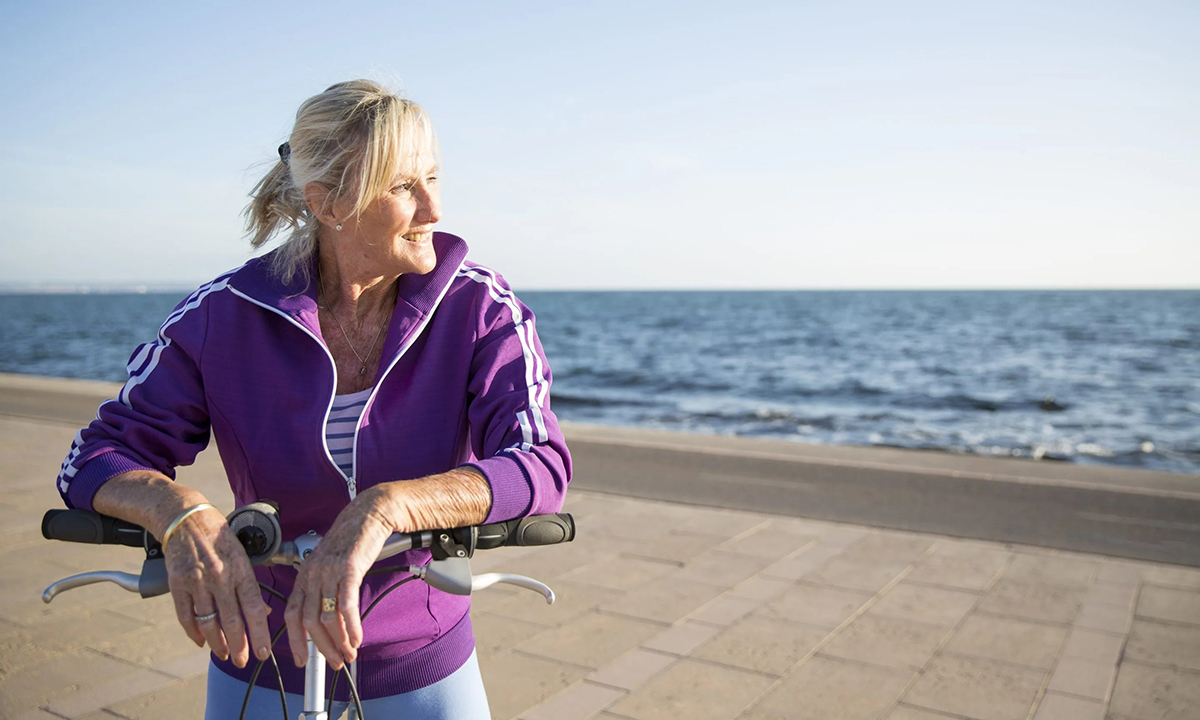
或許你之前就聽說過“積極老齡化”一詞,但它到底是什么意思呢?是不是必須每天都去健身房鍛煉,或者每個周末都要去徒步旅行?
完全不是這樣。根據(jù)世界衛(wèi)生組織(World Health Organization)的說法,積極老齡化包括一系列能夠讓你的思想、身體、情感和精神得到滿足的追求,與年齡大小、健康狀況或者社會經(jīng)濟地位高低無關(guān)。積極老齡化還意味著你需要關(guān)心自己的健康和福祉。
國際積極老齡化理事會(International Council on Active Aging)的創(chuàng)始人及首席執(zhí)行官科林·米爾納表示,按照積極老齡化的原則生活,有助于我們延年益壽、提升生活品質(zhì)。“‘人’是身心統(tǒng)一的整體,身體活動只是其中一個方面。社會聯(lián)系、腦力活動同樣十分重要。”
如何成為“積極老齡化”的踐行者
保持積極心態(tài)
要想實現(xiàn)“積極老齡化”,首先就要對變老保持積極的態(tài)度。耶魯大學(xué)(Yale University)的心理學(xué)家貝卡·利維等人的研究發(fā)現(xiàn),以消極的心態(tài)面對衰老會使個人預(yù)期壽命縮短7.5年。另有研究發(fā)現(xiàn),面對衰老的積極心態(tài)與更健康的體魄之間存在正向聯(lián)系,比如不僅可以降低我們罹患心臟病、糖尿病和癌癥的風(fēng)險,還能夠改善睡眠質(zhì)量。
參與社交活動
根據(jù)美國老年醫(yī)學(xué)會(The American Geriatrics Society)的報告,經(jīng)常與家人和朋友交流的老年人(無論面對面交流還是通過網(wǎng)絡(luò)交流),壽命一般更長,患抑郁癥的風(fēng)險也更低。相反,孤身獨居會增加健康惡化的風(fēng)險。
參與社會事務(wù)
世界衛(wèi)生組織報告稱,無論老人身體或認知狀況如何,參與文化、社會、經(jīng)濟和公民事務(wù)均有助于提升其健康水平,讓其可以更健康地變老。許多活動,例如在社區(qū)做義工、參與代際活動(比如輔導(dǎo)學(xué)生、為兒童讀書、參加家庭聚會)、參加政治事務(wù),甚至為鄰居提供幫助,都能夠提升老人的滿足感,讓他們覺得生活更有意義。
堅持健康的生活習(xí)慣
羅切斯特大學(xué)(University of Rochester)的老年醫(yī)學(xué)專家、醫(yī)學(xué)教授蘇珊·弗里德曼博士稱,我們年輕時的生活習(xí)慣(飲食偏好,是否飲酒、抽煙等)是晚年積極老齡化的基礎(chǔ)。弗里德曼指出,醫(yī)學(xué)專家們越發(fā)清醒地認識到,生活方式對健康衰老確實會產(chǎn)生影響。
弗里德曼說:“不過我們要清楚一點,那就是即便患有慢性疾病或身有殘疾,我們?nèi)匀豢梢赃^上積極、健康、快樂、充實的生活”。此外,無論何時,改換更健康的生活方式都不晚,仍然能夠幫助我們減輕疾病影響,延長壽命。
保持好奇心
專家稱,腦力活動與運動、社交帶來的刺激同等重要。通過參與一些有益于大腦健康的活動,例如上課、演奏音樂、閱讀陌生領(lǐng)域的書籍或者學(xué)習(xí)新技能,我們可以讓大腦保持活力,讓神經(jīng)元處于興奮狀態(tài)。
保持冷靜
老年人要管理的壓力與焦慮情緒(與年輕人)有所不同。《哈佛健康雜志》(Harvard Health)的專家稱,進入老年后,我們會遇到一些新的壓力,比如親人的離世、財務(wù)狀況的變化、生活因為退休而變得沒有那么規(guī)律及身體機能的下降等。我們能夠通過一些非藥物的方法來更好應(yīng)對生活中的起起伏伏,例如鍛煉、深呼吸、正念或者冥想,以及更多社會和心理健康方面的支持。
其他有助于長壽的因素
弗里德曼說,雖然生物與遺傳特質(zhì)、收入水平、教育程度和醫(yī)療資源豐富度等因素對我們能否健康長壽具有重要影響,但每個人,無論具體狀況如何,都可以通過積極的生活方式來迎接衰老的過程。
通過合理運動、控制飲食、保持社交、減輕壓力、避免接觸煙草等有害健康的物質(zhì),多管齊下,我們更有可能讓自己健康變老。她說:“生活方式越健康,我們就能夠過得越好。”
外界因素
雖然個人必須主動作為,但醫(yī)療保健系統(tǒng)、政府和政策制定者也需要為促進健康的老年生活創(chuàng)造條件。麥肯錫全球研究所(McKinsey Global Institute)在2020年發(fā)布的一份報告認為,我們應(yīng)該更多地把健康和老齡化視為經(jīng)濟、社會領(lǐng)域的投資,而不是經(jīng)濟或者社會安全網(wǎng)的負擔(dān)。
該報告指出:“長期的預(yù)防、保健工作不能只靠醫(yī)務(wù)工作者或者醫(yī)療保健系統(tǒng)來完成,而是需要每個人的努力。”在個人層面,如果我們可以給予自己的健康和衰老情況更多關(guān)心,我們就能夠減輕自己給醫(yī)療系統(tǒng)造成的負擔(dān),也可以對經(jīng)濟做出更多的貢獻。
米爾納認為,無論生活在哪里,也無論具體的生活方式或者健康狀況如何,每個人都能夠成為積極老齡化的踐行者。他說:“即便你長期需要他人照看,也可以讓生活過得更為精彩。這樣就能夠讓自己過得更幸福,也更容易長壽。”
“積極老齡化”一詞并沒有嚴(yán)格定義,只是要盡可能地全身心投入其中,“我們不一定要爬上山巔,但還是要邁出第一步。”弗里德曼說道。(財富中文網(wǎng))
譯者:梁宇
審校:夏林
或許你之前就聽說過“積極老齡化”一詞,但它到底是什么意思呢?是不是必須每天都去健身房鍛煉,或者每個周末都要去徒步旅行?
完全不是這樣。根據(jù)世界衛(wèi)生組織(World Health Organization)的說法,積極老齡化包括一系列能夠讓你的思想、身體、情感和精神得到滿足的追求,與年齡大小、健康狀況或者社會經(jīng)濟地位高低無關(guān)。積極老齡化還意味著你需要關(guān)心自己的健康和福祉。
國際積極老齡化理事會(International Council on Active Aging)的創(chuàng)始人及首席執(zhí)行官科林·米爾納表示,按照積極老齡化的原則生活,有助于我們延年益壽、提升生活品質(zhì)。“‘人’是身心統(tǒng)一的整體,身體活動只是其中一個方面。社會聯(lián)系、腦力活動同樣十分重要。”
如何成為“積極老齡化”的踐行者
保持積極心態(tài)
要想實現(xiàn)“積極老齡化”,首先就要對變老保持積極的態(tài)度。耶魯大學(xué)(Yale University)的心理學(xué)家貝卡·利維等人的研究發(fā)現(xiàn),以消極的心態(tài)面對衰老會使個人預(yù)期壽命縮短7.5年。另有研究發(fā)現(xiàn),面對衰老的積極心態(tài)與更健康的體魄之間存在正向聯(lián)系,比如不僅可以降低我們罹患心臟病、糖尿病和癌癥的風(fēng)險,還能夠改善睡眠質(zhì)量。
參與社交活動
根據(jù)美國老年醫(yī)學(xué)會(The American Geriatrics Society)的報告,經(jīng)常與家人和朋友交流的老年人(無論面對面交流還是通過網(wǎng)絡(luò)交流),壽命一般更長,患抑郁癥的風(fēng)險也更低。相反,孤身獨居會增加健康惡化的風(fēng)險。
參與社會事務(wù)
世界衛(wèi)生組織報告稱,無論老人身體或認知狀況如何,參與文化、社會、經(jīng)濟和公民事務(wù)均有助于提升其健康水平,讓其可以更健康地變老。許多活動,例如在社區(qū)做義工、參與代際活動(比如輔導(dǎo)學(xué)生、為兒童讀書、參加家庭聚會)、參加政治事務(wù),甚至為鄰居提供幫助,都能夠提升老人的滿足感,讓他們覺得生活更有意義。
堅持健康的生活習(xí)慣
羅切斯特大學(xué)(University of Rochester)的老年醫(yī)學(xué)專家、醫(yī)學(xué)教授蘇珊·弗里德曼博士稱,我們年輕時的生活習(xí)慣(飲食偏好,是否飲酒、抽煙等)是晚年積極老齡化的基礎(chǔ)。弗里德曼指出,醫(yī)學(xué)專家們越發(fā)清醒地認識到,生活方式對健康衰老確實會產(chǎn)生影響。
弗里德曼說:“不過我們要清楚一點,那就是即便患有慢性疾病或身有殘疾,我們?nèi)匀豢梢赃^上積極、健康、快樂、充實的生活”。此外,無論何時,改換更健康的生活方式都不晚,仍然能夠幫助我們減輕疾病影響,延長壽命。
保持好奇心
專家稱,腦力活動與運動、社交帶來的刺激同等重要。通過參與一些有益于大腦健康的活動,例如上課、演奏音樂、閱讀陌生領(lǐng)域的書籍或者學(xué)習(xí)新技能,我們可以讓大腦保持活力,讓神經(jīng)元處于興奮狀態(tài)。
保持冷靜
老年人要管理的壓力與焦慮情緒(與年輕人)有所不同。《哈佛健康雜志》(Harvard Health)的專家稱,進入老年后,我們會遇到一些新的壓力,比如親人的離世、財務(wù)狀況的變化、生活因為退休而變得沒有那么規(guī)律及身體機能的下降等。我們能夠通過一些非藥物的方法來更好應(yīng)對生活中的起起伏伏,例如鍛煉、深呼吸、正念或者冥想,以及更多社會和心理健康方面的支持。
其他有助于長壽的因素
弗里德曼說,雖然生物與遺傳特質(zhì)、收入水平、教育程度和醫(yī)療資源豐富度等因素對我們能否健康長壽具有重要影響,但每個人,無論具體狀況如何,都可以通過積極的生活方式來迎接衰老的過程。
通過合理運動、控制飲食、保持社交、減輕壓力、避免接觸煙草等有害健康的物質(zhì),多管齊下,我們更有可能讓自己健康變老。她說:“生活方式越健康,我們就能夠過得越好。”
外界因素
雖然個人必須主動作為,但醫(yī)療保健系統(tǒng)、政府和政策制定者也需要為促進健康的老年生活創(chuàng)造條件。麥肯錫全球研究所(McKinsey Global Institute)在2020年發(fā)布的一份報告認為,我們應(yīng)該更多地把健康和老齡化視為經(jīng)濟、社會領(lǐng)域的投資,而不是經(jīng)濟或者社會安全網(wǎng)的負擔(dān)。
該報告指出:“長期的預(yù)防、保健工作不能只靠醫(yī)務(wù)工作者或者醫(yī)療保健系統(tǒng)來完成,而是需要每個人的努力。”在個人層面,如果我們可以給予自己的健康和衰老情況更多關(guān)心,我們就能夠減輕自己給醫(yī)療系統(tǒng)造成的負擔(dān),也可以對經(jīng)濟做出更多的貢獻。
米爾納認為,無論生活在哪里,也無論具體的生活方式或者健康狀況如何,每個人都能夠成為積極老齡化的踐行者。他說:“即便你長期需要他人照看,也可以讓生活過得更為精彩。這樣就能夠讓自己過得更幸福,也更容易長壽。”
“積極老齡化”一詞并沒有嚴(yán)格定義,只是要盡可能地全身心投入其中,“我們不一定要爬上山巔,但還是要邁出第一步。”弗里德曼說道。(財富中文網(wǎng))
譯者:梁宇
審校:夏林
You may have heard the term “active aging,” but what does it really mean? Do you have to hit the gym every day, or hike every weekend?
Not at all. Active aging includes a wide range of pursuits that keep your mind, body, emotions and spirit engaged, regardless of age, health or socioeconomic status, according to the World Health Organization (WHO). It also means being diligent about your own health and well-being.
Following the principles of active aging can help extend longevity and quality of life, according to Colin Milner, founder and CEO of the International Council on Active Aging. “Physical activity is just one of the many elements that makes up a person. “It’s just as important that we are socially connected and that we are intellectually active.”
How to be an active ager
Stay positive
Active aging starts with having a positive attitude about getting older. Research by Yale psychologist Becca Levy and others have found that negative attitudes about aging can trim 7.5 years off your life. Other studies find connections between positive attitudes about aging and better health, including lower risk of heart disease, diabetes, and cancer, as well as improved quality of sleep.
Stay connected
Older people with active social interactions with family and friends — whether in person or virtually — may live longer and reduce their risk of depression, according to The American Geriatrics Society. Conversely, being isolated or lonely increases the odds of poorer health.
Stay involved
Participation in cultural, social, economic, and civic affairs can also help foster wellness and healthier aging regardless of physical or cognitive status, the WHO reports. Activities like volunteering in the community, participating in intergenerational programs (think: tutoring, reading to children, family gatherings), political involvement, or even helping out a neighbor foster a sense of satisfaction and purpose.
Stay healthy at all ages and stages
Your early life behavior—including diet, alcohol and tobacco use—sets the stage for later-life active aging, according to Dr. Susan Friedman, a geriatrician and professor of medicine at the University of Rochester. Friedman points to a growing recognition among medical professionals that lifestyle really does make a difference in healthy aging.
“However, people should know they can live active, healthy, happy, productive lives, even with chronic disease or disability,” says Friedman. And, it’s never too late to adopt healthier behaviors, which can help minimize the effects of disease and extend longevity, she says.
Stay curious
Intellectual engagement is as important as physical and social stimulation, experts say. Efforts that promotes brain health, like taking a class, playing music, reading books about new subjects, or learning new skills, keeps the brain engaged and neurons firing.
Stay calm
Managing stress and anxiety as an older person is different. You may experience new types of stressors, like the loss of a loved one, a change in financial status or less structure in your day due to retirement, as well as physical changes, according to experts at Harvard Health. Exercise, deep breathing techniques, mindfulness or meditation, and increased social and mental health support are just some non-pharmacologic ways to help handle life’s ups and downs.
Other factors that contribute to longevity
While other factors like biology and genetics, income, education, and access to health care, play important roles in healthy longevity, everyone can take an active approach towards aging, regardless of their particular circumstances, Friedman says.
Building in multiple components—physical, dietary, social, stress reduction, and avoiding toxins like tobacco, means you’re more likely to foster your own healthy aging. “The more that we can take this lifecycle approach, the better off we’ll be,” she says.
Beyond the individual
While individuals must take the lead, health care systems, governments and policymakers must also create the means to foster healthy older age. A 2020 report from the McKinsey Global Institute, concluded that we should be thinking about health and aging more as an economic and social investment rather than a strain on the economy or safety net.
“Long-term prevention and health promotion cannot simply be left to healthcare providers or healthcare systems. It is quite literally everybody’s business,” the report said. At the individual level, people who are more engaged in their own health and aging reduce the burden on the healthcare system, and contribute more to the economy.
No matter where you live, or what your specific lifestyle and health situation is, anyone can be an active ager, according to Milner. “Even if you are in long term care, you can always squeeze the juice out of life. So that you can live better, longer, in that circumstance,” he says.
There are no hard and fast rules for active aging, except to engage your whole self as much as possible, says Friedman. “You don’t have to climb the mountain. You just have to take that first step.”






